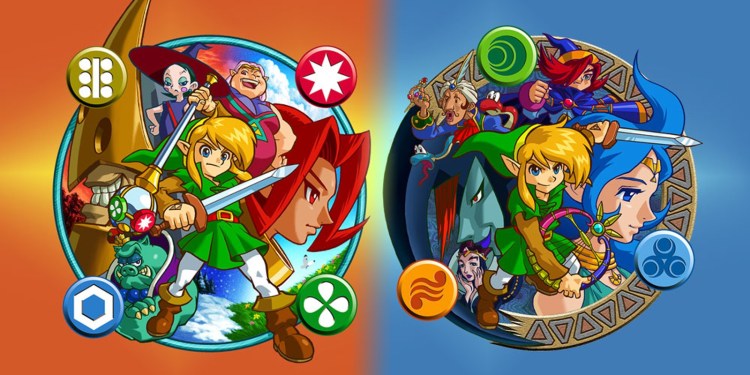Nintendo’s The Legend of Zelda: Link’s Awakening remake for the Switch is the retro gaming event of the month. It’s a fantastic re-imagining of one of the best games in the series, at the same time showing off the timelessness of the original’s gameplay and design while showcasing adorable new graphics.
A lot of people love Link’s Awakening. My colleague Jeff Grubb regards it as his favorite game of all time. In the build-up to the release of the remake, I’ve seen other people express similar sentiments. I love Link’s Awakening, too. But amid all of the praise showering down on both the original and the remake, I keep thinking about a pair of other Zelda games: Oracle of Ages and Oracle of Seasons.
Those two are the closest we have to direct sequels to Link’s Awakening. Released for the Game Boy Color in 2001, they have similar graphics and gameplay. If you compare either of them with a screenshot of the Game Boy Color version of Link’s Awakening, it can be hard to spot the difference.
But the Oracle games are not lazy sequels. They do plenty of innovating. First off, these games are connected but different. It’s not like Pokémon Red and Blue, where you had two versions of the same experience with some small differences. Oracle of Seasons and Oracle of Ages both have their own world map, dungeons, characters, and story. Those are two separate, full-sized Zelda adventures.
June 5th: The AI Audit in NYC
Join us next week in NYC to engage with top executive leaders, delving into strategies for auditing AI models to ensure fairness, optimal performance, and ethical compliance across diverse organizations. Secure your attendance for this exclusive invite-only event.
Changing the world
Each one also focuses on different mechanics. In Oracle of Ages, you can use the Harp of Ages to travel between the past and present versions of the world. This has a similar effect as the Light and Dark Worlds from A Link to the Past. You’ll have to travel between the two to solve puzzles, and your actions in the past will impact the world in the present.
This isn’t very innovative. It’s a bit of a retread of what players did in 1998’s Ocarina of Time. Oracle of Seasons is more creative. You use the Rod of Seasons to change the switch between fall, summer, winter, and spring versions of the world.
Ages is more about puzzles, while Seasons puts more emphasis on combat. Both games also feature rings as a fun collectible and upgrade system. You can find and earn rings throughout each game, and equipping them will give you different effects (like making your sword attacks do more damage).
The way these two games interact with each other is what really makes them interesting. Once you beat one, you get a code that can enter before you start the next game. This will change some small details in the story. Once you beat both titles, you can access additional final bosses and see the true ending. So although both games are separate adventures, this system ties them together and gives you an awesome reward for finishing both of them.
It’s likely that Link’s Awakening on Switch will be a big hit. I wonder if Nintendo will give the same treatment to the Oracle games. In some ways, they deserve it more. While Link’s Awakening always gets a lot of love from fans, the Oracle games don’t have the affection they deserve. They deserve a chance to endear themselves to a new audience.
The third oracle
There’s also an awesome opportunity if Nintendo wants to bring back the Oracle games. You see, the original plans called for three titles: The Legend of Zelda: Mystical Seed of Power, Mystical Seed of Wisdom, and Mystical Seed of Courage. It makes sense, since objects in Zelda often come in threes, such as the Triforce (which has three parts: Power, Wisdom, and Courage).
Nintendo and Capcom (who developed these games) eventually scaled those ideas back to just two games, what we know now as Oracle of Ages and Oracle of Seasons. Nintendo could go beyond remaking Ages and Seasons and actually bring that canceled third game back to life. In my mind, this would be called Oracle of Hours, and would have players switch between day and night.
That’s a fantasy that I doubt I’ll ever see come true, but I can’t help but dream. I just hope that Nintendo doesn’t forget about the Oracle games. Someday, I want fans to regard them as highly as they do Link’s Awakening.
The RetroBeat is a weekly column that looks at gaming’s past, diving into classics, new retro titles, or looking at how old favorites — and their design techniques — inspire today’s market and experiences. If you have any retro-themed projects or scoops you’d like to send my way, please contact me.


